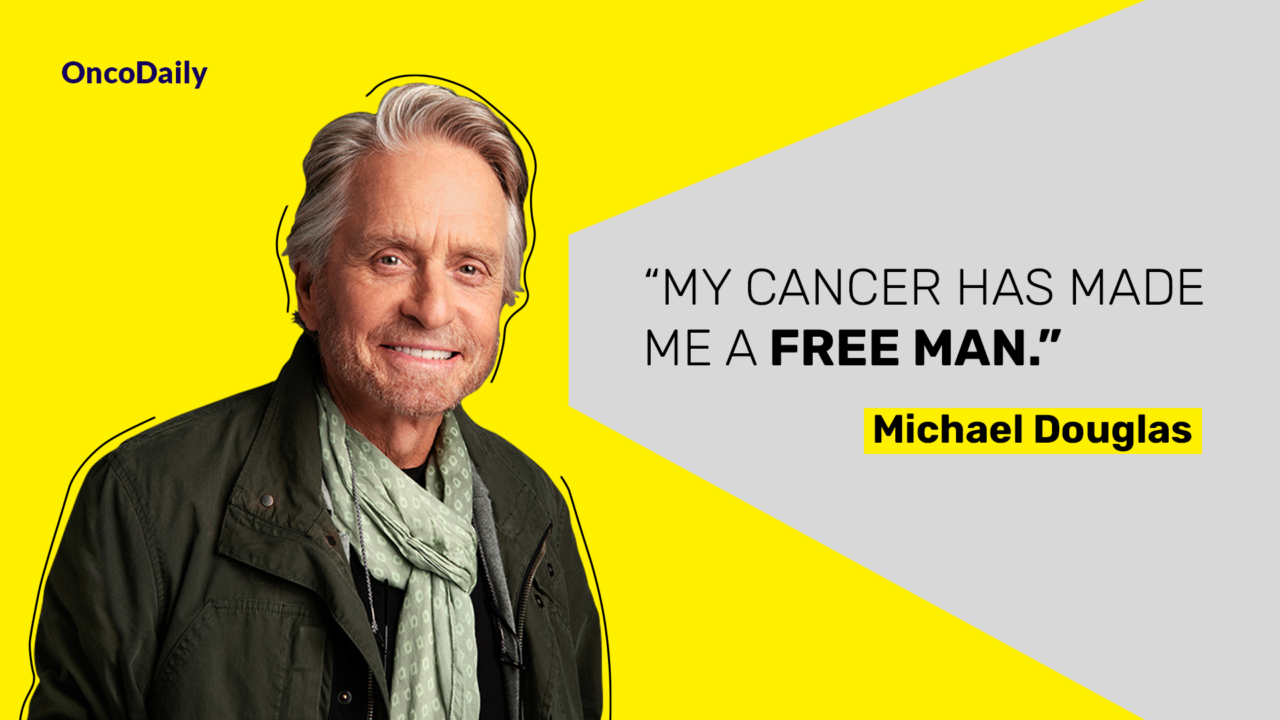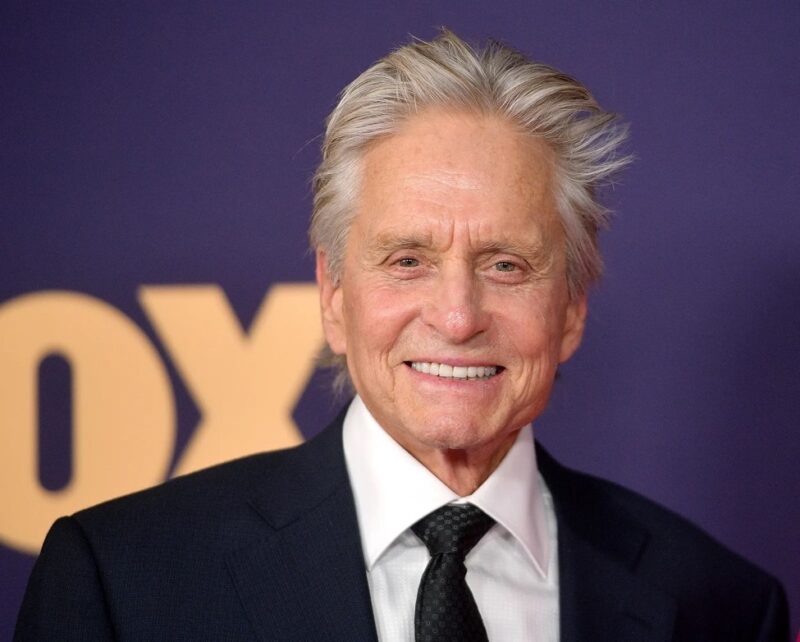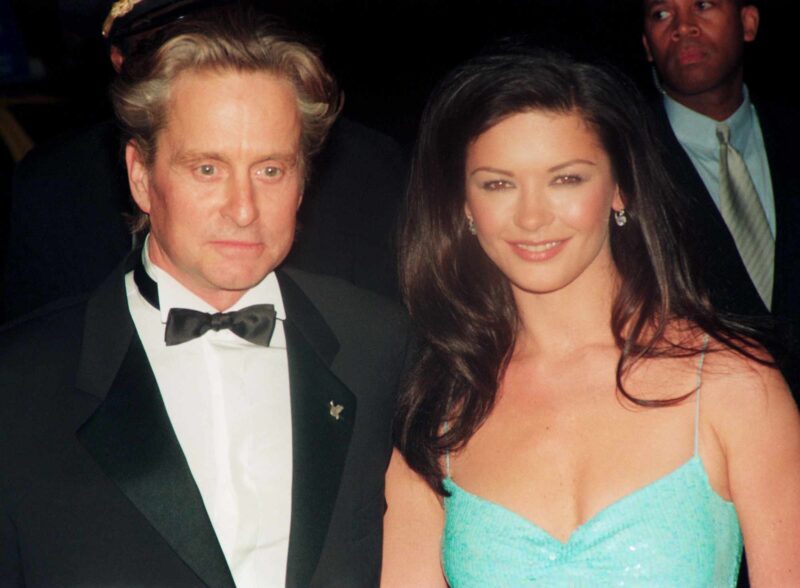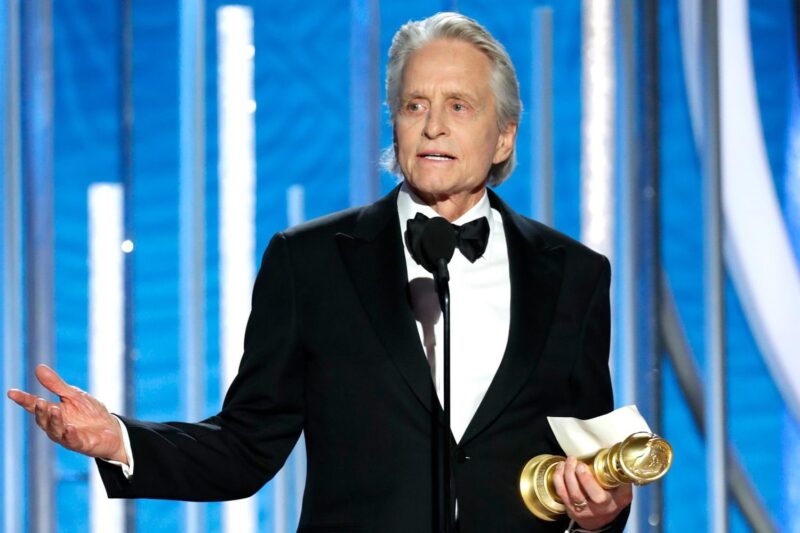
Michael Douglas: The Untold Story of His Battle Against Cancer
Michael Douglas, says “My cancer has made me a free man.”

Thirteen years after surviving neck and throat cancer, two-time Academy Award-winning actor Michael Douglas, says that dying wasn’t part of his thought process about his disease. In 2010, he was diagnosed with throat cancer.
His diagnosis came after experiencing symptoms for almost a year that were repeatedly misdiagnosed as an infection. Eventually, a biopsy revealed the advanced cancer, and he underwent aggressive chemotherapy and radiation treatments.

said the star to Paris Match. By 2011, being cancer free, Douglas is positive that the disease is long behind him.
“I check every six months,” he explained of his health checkups. “I believe, and I hope, that I’ve escaped. One thing is certain, my cancer has made me a free man.”
What is the reason for lying about his diagnosis?
In a 2013 interview with actor Samuel L. Jackson, Douglas disclosed that his diagnosis was tongue cancer. “This was right before I had a big tour for Wall Street, so we said, ‘There’s no way we can cancel the tour and say we don’t feel well,‘” said Douglas while explaining his reason for lying about his diagnosis. He said:

Douglas revealed that’s when his surgeon said: “Let’s just say it’s throat cancer.” Douglas expressed that the primary worry was that, due to the tumor’s size and the advanced stage of the disease, surgery to remove parts of his jaw and tongue would probably be necessary.
He feared this would lead to numerous questions about his prognosis and false reports about potential disfigurement while promoting his new film. Therefore, they decided to keep the truth concealed for a while.
Douglas experienced symptoms for almost a year before receiving a cancer diagnosis. Despite specialists in the United States attributing his symptoms to an infection, it was during a visit to a teaching hospital in Quebec’s Mont-Tremblant, while at his summer home, that a doctor discovered a lump in the back of his throat.
Shortly thereafter, a biopsy confirmed stage 4 tongue cancer, specifically stage 4 squamous cell carcinoma for the actor.
What is Tongue Cancer? What are the Symptoms and Risk Factors?
According to the American Cancer Society, about 58,450 new cases of oral cavity and oropharyngeal cancer will be diagnosed in 2024. Several types of cancer can affect the tongue, but the most common is squamous cell carcinoma (SCC).
Squamous cell carcinoma (SCC) originates in the squamous cells located in the outer layer of the skin. While SCC commonly occurs on areas of the body frequently exposed to the sun, it can also develop in mucous membranes, such as the lining of the mouth.
The most common visual symptoms of tongue cancer include red (erythroplakia) or white (leukoplakia) patches on the tongue, a lump on the side of the tongue that bleeds easily, and a red or grayish ulcer on the tongue that doesn’t heal.
Additional symptoms of tongue cancer may include thickening of the skin in the mouth, a persistent sore throat (chronic pharyngitis), neck pain, ear pain, the sensation of something stuck in the throat, numbness in the tongue or other areas of the mouth, a burning sensation on the tongue, difficulty or pain with chewing and swallowing, hoarseness, jaw swelling, loose teeth, and sudden changes in the fit of dentures.
The primary risk factors are extensive smoking (smokers are 5x more likely to develop tongue cancer than nonsmokers) and excessive alcohol consumption (alcohol use disorder).
Other tongue cancer risk factors include:
- HPV (human papillomavirus). A history of HPV is a leading cause of base of tongue cancer. Less commonly, it can cause oral tongue cancer.
- Chewing tobacco.
- Betel nut.
- Family history of oral or oropharyngeal cancers.
- Personal history of cancer (especially squamous cell carcinoma).
How is Tongue Cancer Typically Treated?
Treatment for tongue and oral cancers typically involves a multidisciplinary approach, tailored to the cancer’s stage, location, and the patient’s overall health. The main treatment options include:
- Surgery: Often the primary treatment, especially for early-stage cancers. This may involve removing part or all of the tongue (glossectomy) and nearby lymph nodes.
- Radiation Therapy: Used alone for early-stage cancers or in combination with surgery or chemotherapy for more advanced cases
- Chemotherapy: Frequently combined with radiation (chemoradiation) for advanced cancers or to reduce the risk of recurrence after surgery.
- Targeted Therapy: Drugs like cetuximab that target specific cancer cell properties may be used for advanced or recurrent cases.
- Immunotherapy: Emerging treatments that harness the body’s immune system to fight cancer cells.
- Reconstructive Surgery: Often performed alongside tumor removal to restore function and appearance.
Each treatment plan is personalized, considering factors such as cancer stage, location, and the patient’s preferences. Regular follow-ups and supportive care are crucial components of the overall treatment strategy, aiming to improve both survival rates and quality of life for patients with tongue and oral cancers.
Where was treated, Michael Douglas?

Michael Douglas received his cancer treatment at Memorial Sloan Kettering Cancer Center in New York, under the care of renowned specialists Dr. Jatin P. Shah, Dr. David Pfister, and Dr. Nancy Lee.
The actor credits their expertise for saving his life, stating, “For a century, Memorial Sloan Kettering Cancer Center has helped lead the way in head and neck oncology, that century I can say, saved my life”. Douglas underwent an intensive 7-week regimen of radiation and chemotherapy, describing it as navigating through “the seven circles of hell”.
Despite the challenges, he remained resilient, sharing, “I have worked eight hours a day through the six weeks of radiation treatments. So it can be done without bringing your life to a standstill”. His experience highlights the importance of specialized care and a positive mindset in battling cancer.
What was the real cause of his cancer?
Douglas has been very open about his battle with cancer and the factors contributing to it. He has mentioned that his cancer was linked to the human papillomavirus (HPV), a sexually transmitted infection, and initially made headlines when he attributed it to oral sex.
Was his cancer actually HPV-associated?
In a previous interview with The Guardian, Douglas dismissed claims that his throat cancer was caused by smoking and candidly explained “Without wanting to get too specific, this particular cancer is caused by HPV, which actually comes about from cunnilingus.”
After this interview where he said that his remarks about oral sex potentially could be a risk factor for the type of throat cancer he had quickly became widely circulated across the Internet.
Later, during an event in New York, Douglas playfully commented on the attention his interview had received.

Douglas, said at an American Cancer Society event where he was honored with the Marvin Hamlisch Memorial Award, named after the late composer.

In 2013 According to The Hype, Douglas acknowledged in an interview that his son’s prison sentence on drug charges might have played a role in the development of his diagnosis. Douglas explained, “I did worry if the stress caused by my son’s incarceration didn’t help trigger it.
But yeah, it’s a sexually transmitted disease that causes cancer.’’ the actor continued. “And if you have it, cunnilingus is also the best cure for it,” Douglas said jokingly.
However, he later clarified that while HPV can cause certain oral cancers, it was not necessarily the specific cause of his cancer. He also pointed out that his long history of smoking and alcohol consumption likely contributed to his condition.
Dr. Maura Gillison, a head and neck medical oncologist and professor at Ohio State University Comprehensive Cancer Center, said “Oral sex doesn’t cause oral cancer, it’s a means by which to acquire an infection that rarely causes cancer.”
When should people get the HPV vaccine?
Ideal Age for HPV Vaccination
Children aged 11-12 years: The optimal time for children to receive the HPV vaccine is between the ages of 11 and 12. At this age, they should receive two doses of the vaccine, spaced 6 to 12 months apart. Starting early ensures the best protection before any potential exposure to the virus.Early Start
Option: The HPV vaccine can be administered as early as age 9. This early start can be beneficial for children who may be at higher risk or for those who want to ensure timely protection.
Catch-Up Vaccination
Teens and Young Adults (13-26 years): If children did not receive the vaccine at the recommended age, it is crucial to catch up. For those starting the HPV vaccine series on or after their 15th birthday, three doses are required over a six-month period. This catch-up vaccination is essential to provide protection against HPV-related cancers.
Everyone through age 26 years: It is recommended that all individuals up to age 26 receive the HPV vaccine if they were not fully vaccinated earlier. Completing the vaccine series by this age maximizes the vaccine’s effectiveness.
HPV Vaccination for Adults
Adults aged 27-45 years: While HPV vaccination is not routinely recommended for everyone older than 26, some adults between the ages of 27 and 45 may choose to get vaccinated. This decision should be made in consultation with a healthcare provider, considering individual risk factors and potential benefits.
Vaccination in this age group is less effective due to higher rates of prior HPV exposure, but it can still offer protection against strains not previously encountered.
Why the HPV Vaccine is Important?
It remains uncertain whether HPV alone can initiate the cellular changes that lead to throat or mouth cancer, or if this process requires a combination of factors such as smoking, as Michael Douglas suggested regarding his own cancer.
Of course, some people who develop throat or mouth cancers have no known risk factors for the condition. Genetics can play a role in this cancer, too.
Throughout his journey, Douglas has become an advocate for cancer awareness, particularly regarding HPV-related cancers. He has emphasized the importance of vaccination against HPV to prevent such cancers.
Michael Douglas’ way of giving back
Fundraising for Montreal Hospital
One of Douglas’s significant contributions is his fundraising efforts for the Montreal hospital where his cancer was detected. In 2011, he announced plans to raise funds for McGill University’s head and neck cancer fund.
“I am eternally grateful to the team at McGill for their role in my diagnosis and treatment. This is my way of giving back,” Douglas shared. His commitment to this cause underscores the importance of early detection and specialized care in cancer treatment.

Michael Douglas speaking during the 17th fundraiser for the McGill Head and Neck Cancer Fund. Photo: Howard Kay
Partnership with the Oral Cancer Foundation
Douglas also works closely with the Oral Cancer Foundation, an organization dedicated to reducing suffering and saving lives through prevention, education, research, advocacy, and patient support activities.
He has become a prominent figure in their campaigns, using his platform to spread awareness about oral cancers and the critical role of HPV vaccination in prevention.

Advocacy for HPV Vaccination
Douglas’s cancer was linked to the human papillomavirus (HPV), a common sexually transmitted infection. He has been outspoken about the importance of HPV vaccination, particularly for young people.

His advocacy has helped destigmatize HPV-related cancers and encouraged more people to consider vaccination.
Interesting facts about Michael Douglas’ personal life

Michael Douglas married Diandra Luker in 1977, and they had a son named Cameron before separating in 1995 and eventually divorcing. in 1998 Douglas first met Zeta-Jones at the Deauville Film Festival, where she was promoting The Mask of Zorro and he was promoting A Perfect Murder.
On The Jonathan Ross Show in 2016, Douglas shared that after seeing Zeta-Jones as Elena Montero, he asked his publicist to set up a meeting with her.
“I met her in the bar and was a total gentleman,” Douglas said. He recalled asking her, “By chance do you want to come back and have a nightcap?” Later that night when Zeta-Jones met him, he told her, You know, I’m going to be the father of your children.”
On November 18, 2000, Douglas married Welsh actress Catherine Zeta-Jones, his co-star from Traffic. The couple had a son, Dylan Michael Douglas, in August 2000, and a daughter, Carys Zeta Douglas, in April 2003.
In 2010, Zeta-Jones took a break from her career to support her husband during a challenging period as he successfully fought throat cancer, which took a toll on the family. The next year, Zeta-Jones sought treatment for bipolar II, a form of manic depression, and publicly disclosed her diagnosis.
She expressed to InStyle magazine that, although she typically doesn’t broadcast her personal issues, she hoped that by sharing her experience with bipolar disorder, others would understand that it is completely manageable. In April 2013, Zeta-Jones checked into a treatment center again to manage her illness.
In August 2013, it was announced that Douglas and Zeta-Jones had separated after over 12 years of marriage. Actually they reconciled in 2014 after a brief separation.
Catherine Zeta-Jones on Michael Douglas’s Cancer Battle: A Journey of Love and Fury
Catherine Zeta-Jones, the Oscar-winning actress and wife of Michael Douglas, has been candid about her emotional journey during her husband’s cancer diagnosis and treatment. In a heart-wrenching revelation, Zeta-Jones expressed her frustration with the medical system, stating, “I’m furious that it took so long to diagnose what was wrong.”
The actress’s raw emotions highlight the challenges faced by families dealing with cancer. Zeta-Jones admitted, “I was a mess. I’ll be quite frank, I was a mess.” This honest confession resonates with many who have supported loved ones through serious illnesses.
Despite the turmoil, she stood firmly by Douglas’s side, demonstrating the strength of their bond.

she shared, emphasizing the couple’s resilience. The actress’s experience sheds light on the importance of early detection and the impact of a cancer diagnosis on family dynamics.
Her story serves as a powerful reminder of the emotional toll cancer takes on caregivers and the crucial role of support systems in the healing process.

Michael Douglas: A Storied Career in Hollywood
Top Movies
Michael Douglas has had an illustrious career with numerous standout films. Here are some of his most notable movies:
- Wall Street (1987): Douglas’s portrayal of corporate raider Gordon Gekko earned him an Academy Award for Best Actor. His iconic line, “Greed, for lack of a better word, is good,” remains a cultural touchstone.
- Fatal Attraction (1987): In this psychological thriller, Douglas plays a man whose extramarital affair turns deadly. The film was a box office hit and has since become a classic.
- Basic Instinct (1992): Douglas stars as a detective entangled with a seductive and possibly murderous novelist, played by Sharon Stone. The film is known for its provocative content and intense performances.
- Romancing the Stone (1984): This adventure-comedy solidified Douglas’s status as a leading man. He plays Jack Colton, a rugged adventurer, alongside Kathleen Turner.
- The Game (1997): Directed by David Fincher, this thriller features Douglas as a wealthy banker who gets caught up in a mysterious and dangerous game.
- Wonder Boys (2000): Douglas received critical acclaim for his role as a disheveled professor in this dramedy, showcasing his versatility as an actor.
- Behind the Candelabra (2013): Douglas’s portrayal of Liberace in this biopic earned him an Emmy Award, highlighting his ability to take on complex and challenging roles.
Top Awards
Michael Douglas has received numerous awards throughout his career, reflecting his talent and contributions to the film industry:

- Academy Awards:
- Best Actor for Wall Street (1988)
- Best Picture as a producer for One Flew Over the Cuckoo’s Nest (1976)
- Golden Globe Awards:
- Best Actor in a Motion Picture – Drama for Wall Street (1988)
- Best Actor in a Miniseries or Motion Picture Made for Television for Behind the Candelabra (2013)
- Cecil B. DeMille Award for lifetime achievement (2004)
- Primetime Emmy Awards:
- Outstanding Lead Actor in a Miniseries or a Movie for Behind the Candelabra(2013)
- Screen Actors Guild Awards:
- Outstanding Performance by a Male Actor in a Miniseries or Television Movie for Behind the Candelabra (2013)
- AFI Life Achievement Award:
- Honored in 2009 for his contributions to the film industry
Top Facts
Here are some interesting facts about Michael Douglas’s life and career:
- Family Legacy: Michael is the son of legendary actor Kirk Douglas, and he has continued his father’s legacy in Hollywood.
- Early Career: Before becoming a household name, Douglas worked as an assistant director on several of his father’s films in the 1960s.
- Roommates with Danny DeVito: In the late 1960s, Douglas shared a New York apartment with fellow actor Danny DeVito, paying $75 each per month.
- Producer Acclaim: Douglas produced the critically acclaimed One Flew Over the Cuckoo’s Nest, which won the Academy Award for Best Picture.
- Personal Struggles: Douglas has been open about his battle with throat cancer, attributing his survival to aggressive treatment and the support of his family, especially his wife, Catherine Zeta-Jones.
- Marriage to Catherine Zeta-Jones: Douglas and Zeta-Jones share a unique bond, including the same birthday, September 25th, though 25 years apart.
- Philanthropy: Douglas is an advocate for cancer awareness and has supported various charitable causes throughout his career.
Michael Douglas’s journey in Hollywood is marked by iconic roles, prestigious awards, and a legacy of resilience and talent. His contributions to the film industry continue to inspire and entertain audiences worldwide.
Written by Mariam Khachatryan, MD

